Ground source heat pumps: Our guide to this low carbon heating option
A low-carbon alternative to gas, ground source heat pumps offer a long-term energy efficient option for heating your home. Here's everything you need to know
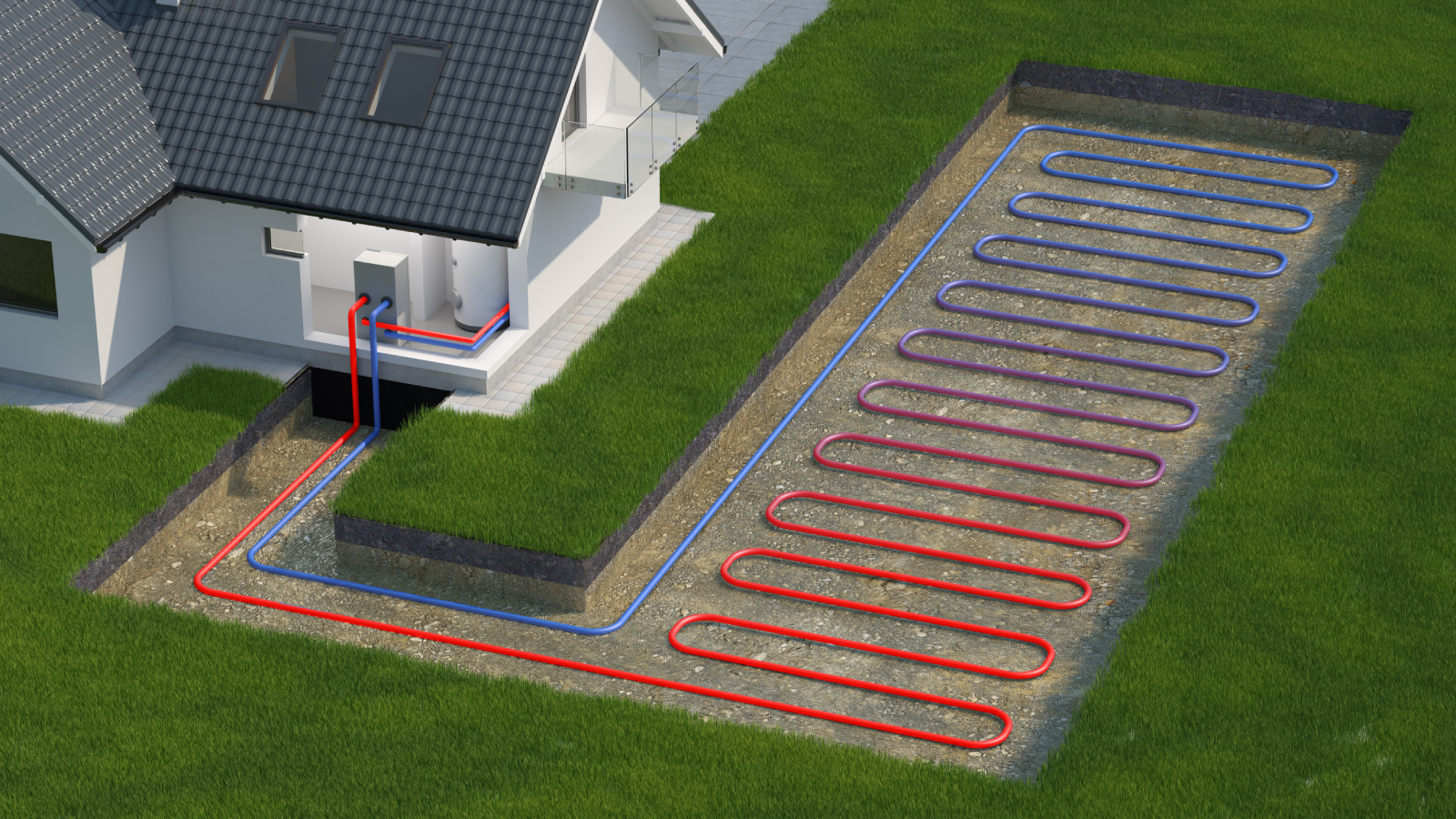
Bring your dream home to life with expert advice, how to guides and design inspiration. Sign up for our newsletter and get two free tickets to a Homebuilding & Renovating Show near you.
You are now subscribed
Your newsletter sign-up was successful
Ground source heat pumps are a low-carbon heating solution playing a part in decarbonising the UK's housing stock, particularly as energy prices rise and climate change heightens.
"A ground source heat pump draws heat from beneath the ground," explains a Vaillant spokesperson, "and raises this heat to a useable temperature to provide heating and hot water to domestic homes and other buildings."
However, with the requirements for switching to or installing a ground source boiler including the need for available land, financial investment and potential changes inside your home, it's important to be clear on exactly what's involved.
On a positive note, for those homes that do suit the use of a ground source heat pump, the outcome is an efficient, long-lasting low-carbon system, with little maintenance requirements. This guide covers how they work, and what you need to know before investing in one.
What do ground source heat pumps look like?

Need more advice or inspiration for your project? Get two free tickets to the Homebuilding & Renovating Show.
Ground source heat pumps may seem complex compared to air source heat pumps, but they are quite simple bits of kit. They use a series of buried pipes that extract the energy from the sun that warms the ground. The heat pump then amplifies that energy into useful heat for your home.
There are two main elements to a ground source heat pump system:
- The ground array - this can be either a horizontal grid of pipes or two or three vertical boreholes
- A heat pump - installed inside the house, either in cupboards or dedicated plant rooms, often located on an outside wall to provide for easy access to the pipework. Some units include a hot water cylinder and can be the size of a large filing cabinet
Types of ground source heat pump
"A heat pump can collect energy from the air, beneath the ground and from a water source," says a Vaillant spokesperson, "and ground source heat pumps have two main methods of collecting heat from the ground.
Bring your dream home to life with expert advice, how to guides and design inspiration. Sign up for our newsletter and get two free tickets to a Homebuilding & Renovating Show near you.
"This can be through a horizontal ground array where the pipe is laid approximately 1m below the ground surface over a large space such as a field, or alternatively, ground source heat pumps can collect their heat through a vertical or borehole array, which is a loop of pipe that is drilled further down into the earth."
In addition there is a water source heat pump, which while slightly different, does normally get considered in the ground source heat pump category - information which is all important to know when asking 'is my home suitable for a heat pump'.
Horizontal ground array
Formed from either straight pipes or coiled pipes (known as slinkies), there is no technical or efficiency difference between the two types of pipe and the installer (together with the manufacturer), will advise which is best for your situation.
Whether you choose a horizontal array comes down to how much space does a ground source heat pump need.
Both straight and coiled pipes should ideally be 1.2m below ground level, and equally as important as the depth, is the spacing between the pipes. As the horizontal ground array is collecting heat introduced to the ground by the sun, pipes need to be spaced sufficiently far apart to ensure they do not take more heat than they should and chill the ground.
The guidelines are 3m for straight pipes and 5m for slinkies (assuming clay soil but wider for other soil types). In addition, pipes need to be at least 5m from the boundary with any adjoining property.
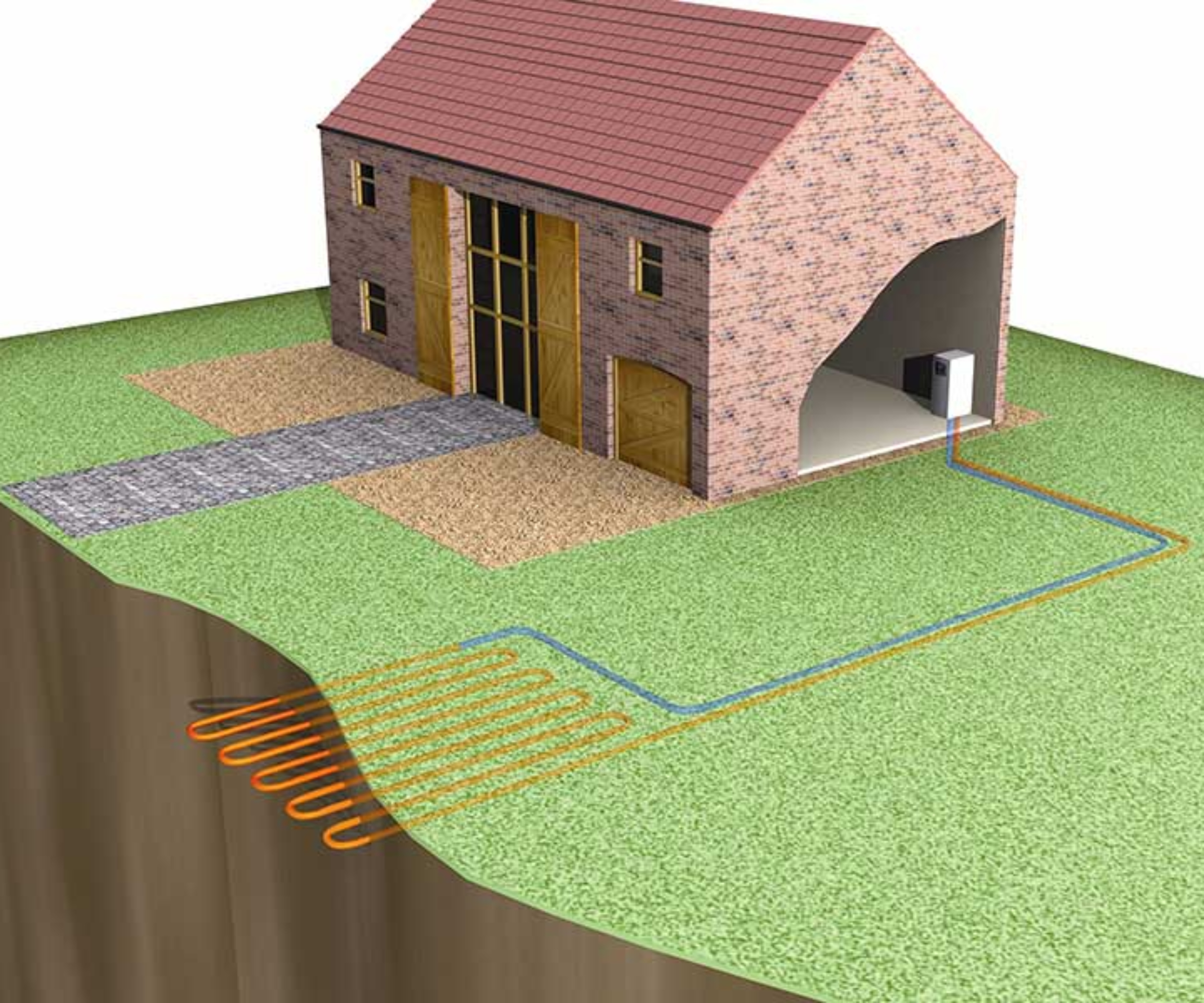
Vertical array
A vertical array will have boreholes drilled into the ground and connected across their tops.
The number and depth of boreholes will be dictated by the size of the heat pump and the geology. These can be anything from 70m to 120m deep.
As the temperature of the ground rises, it is often advantageous to have fewer, deeper boreholes, but that is not always possible. As an example, a 8kW heat pump is likely to need at least three boreholes around 70m deep.
They do not need a large area of land and if the price is right, a vertical array is a good option. However, the price of boreholes can vary hugely across the country.
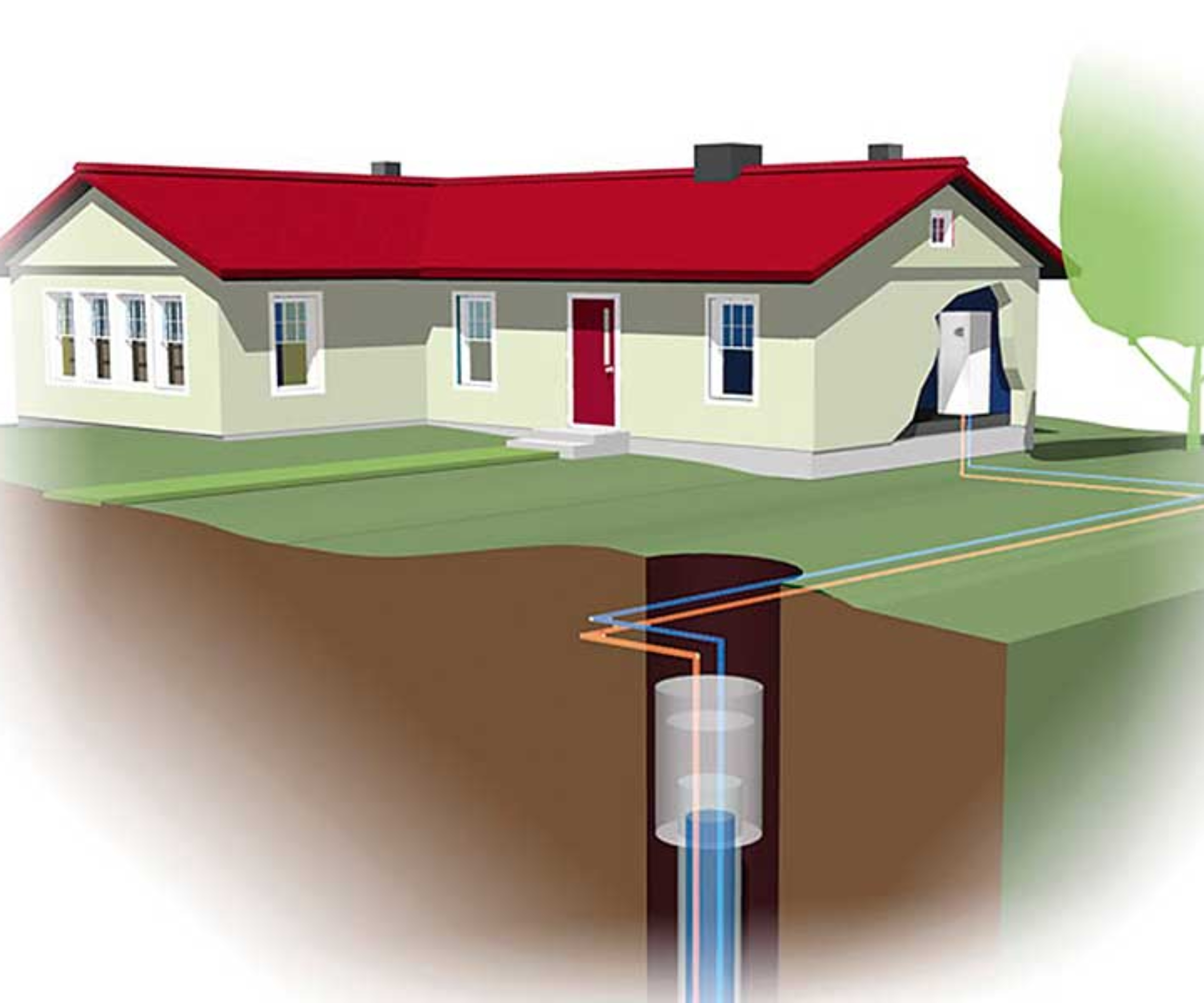
Ground source heat pumps that use water
Though far less common, you can also make use of bodies of water, such as lakes, rivers, ponds and streams, using a ground source heat pump system. Known as water source heat pumps, pipes are installed via pond mats submerged into the water.
Not only does this remove the need for disruptive digging, but the return energy to the heat pump is generally 5-6°C higher than standard collectors, improving the overall efficiency.
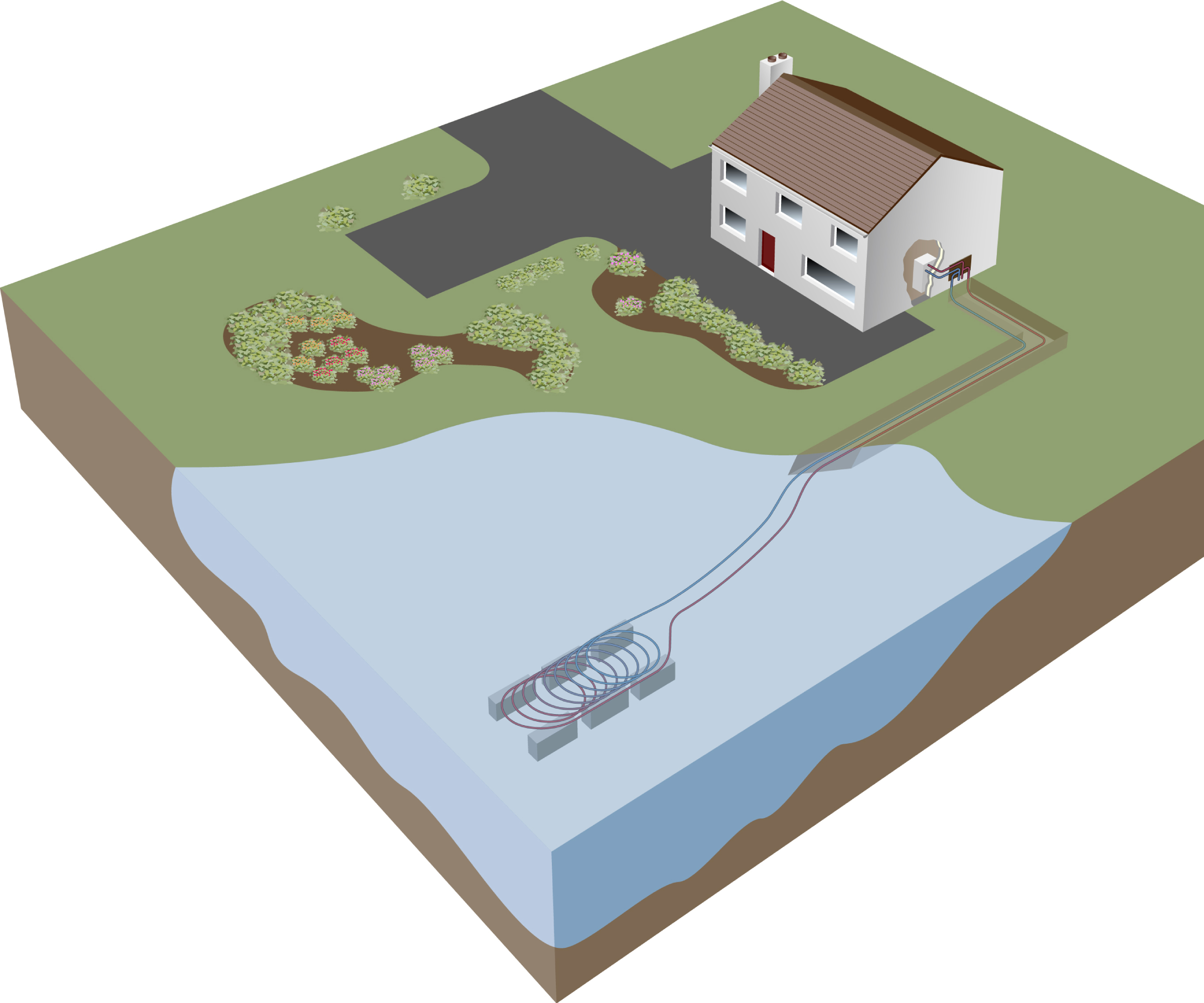
How ground source heat pumps work
Once the pipes have been installed, a mix of water and anti-freeze is pumped around the ground array pipes to absorb the low-grade heat provided by solar energy and stored in the ground.
The heat pump uses compression and expansion technology (as your fridge does), to extract and amplify that heat, increasing the temperature and making it useful in the house.
The ground loop of any ground source heat pump is made up of a number of pipe loops - anything from 2 loops to 12 loops - that are connected to a manifold in a bespoke chamber in the ground. There are then two slightly larger bore pipes that connect the manifold to the heat pump unit in the house.
The amount of heat that can be collected will be dictated by the soil conditions and the amount of unshaded land available. Clay, for example, holds more heat than sand.
As a rule of thumb, an area of 50m2 is needed for each 1kW of heat output. So an 8kW heat pump will need 400m2, assuming damp clay soil. (For context, a tennis court is 260m2.)
Before installing a ground source heat pump, a good installer will investigate the ground conditions to determine the type of soil, if there is sufficient space for a horizontal array, or if boreholes will be necessary.
Find out more about how ground source heat pumps work with our video…
"Heat pumps do require a small amount of electricity to run," adds a Vaillant spokesperson, "but 75% of the energy required comes from the air, ground or water"
Because ground source heat pumps use electrical energy in a highly-efficient way to produce heat, this significantly reduces heating running costs and CO2 emissions. They can also be combined with renewable electricity sources such as solar PV panels, making them an even greener option.
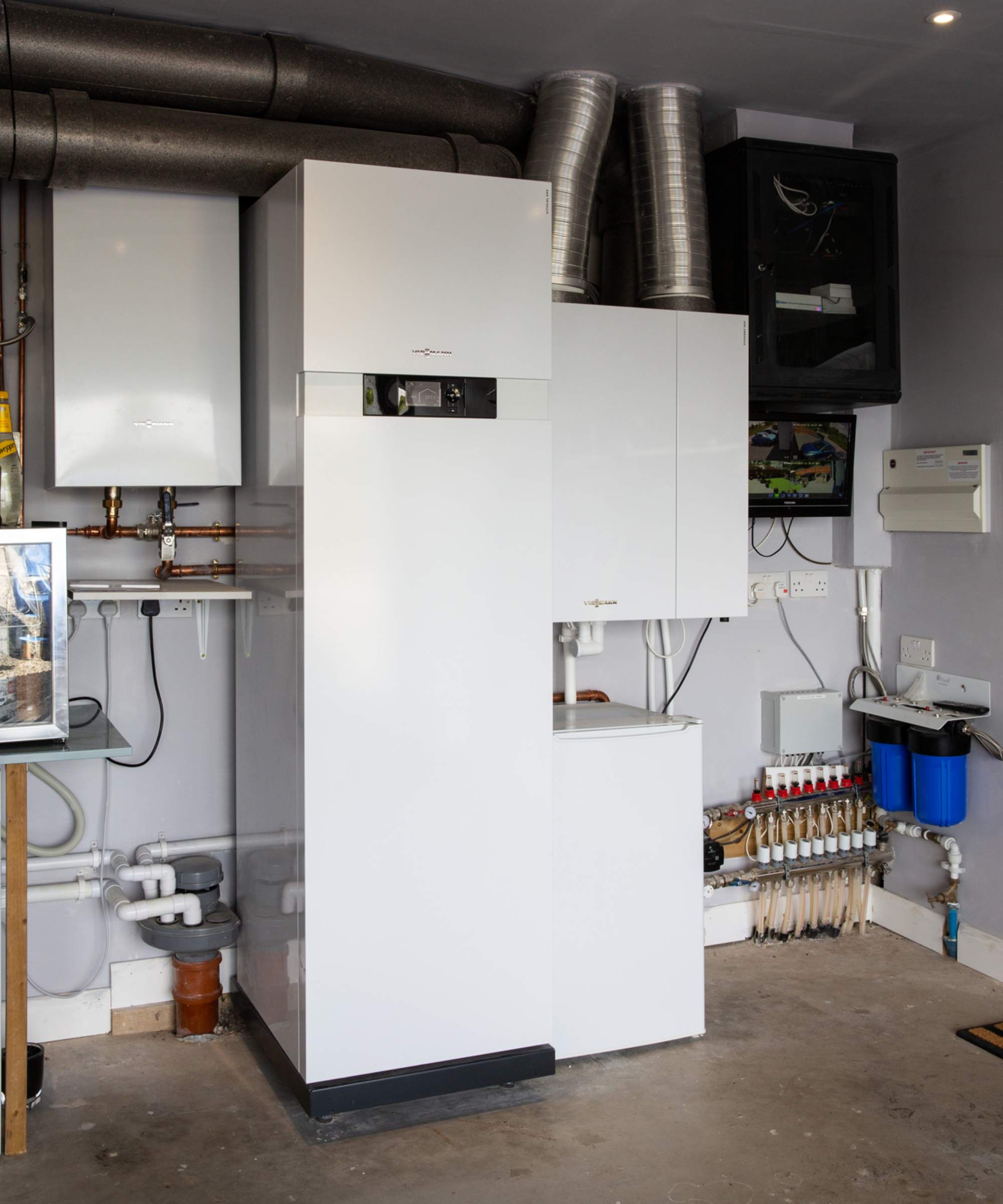
Advantages of GSHPs
There a good number of benefits to ground source heat pumps vs gas boilers, including:
- Running cost will be lower than for fossil fuel fed systems
- If you sign-up to a renewable energy-only electricity supplier then CO2 emissions for the whole house, not just the heating system, will be effectively zero. You could also consider running a ground source heat pump along with solar PV panels to provide electricity for the heat pump
- Once initial issues are dealt with you will have a heating system that is as reliable as a gas boiler and likely to last twice as long
- The Boiler Upgrade Scheme is available to help offset some of the costs of ground source heat pumps
Disadvantages
- The high capital cost of installing a ground source is prohibitive to many
- There will be significant disturbance to the garden, particularly when installing a horizontal ground array
- You may also need to factor in the cost of upgrading your home's insulation and could need to replace some types of radiators for low-flow versions, larger ones or even underfloor heating
Cost & efficiency
Efficiency is stated as the CoP (coefficient of performance) and a typical figure for a ground source heat pump would be around 4.0.
This means that for each 1kW of electricity used to drive the heat pump, it will produce 4.0kW of heat. It is primarily this efficiency of around 400% that makes ground source heat pumps a good idea.
The key issues to reducing your initial costs and ensuring low running costs and high efficiency are:
- Taking a fabric first approach to your home – as with any form of heating, a well-insulated house helps. It could mean you need a smaller heat pump, a smaller ground array (or fewer boreholes) and require less electricity to power it - reducing both your capital and running costs
- Installing a well-designed system – specifying a heat pump is more complex than specifying a gas boiler. It is common to over-specify the size of your gas boiler ‘just in case’, but this is not a good idea when it comes to heat pumps. An over-sized system is more expensive and operates less efficiently than the right sized one
Costs
Complete ground source heat pump costs for a 240m2 home, including installation, will start from around £16,000 but there are a number of factors which impact the costs including:
- The complexity of the installation, including the distance from the heat pump unit to the ground loop manifold chamber which will add to the installation cost
- The type of installation – more specifically, whether a horizontal or vertical array is required
- Bigger properties will need larger heat pumps, even possibly more than one unit, alongside a more complex hydraulic design
FAQs
How big should a ground source heat pump unit be?
Big enough to heat the house, and no more. A modern 4-bedroom house is likely to need an 8kW heat source but could often have a 20kW boiler installed.
There are commercial and technical reasons for this oversizing a gas boiler, but a heat pump is not the same. In that situation the heat pump would need to be 8kW and no more, to achieve maximum efficiency.
A good installer will calculate the exact amount of heat needed for the house to determine the size of the heat pump needed.
Do I need planning permission?
There is nothing externally visible and it is usually considered Permitted Development so you shouldn't require planning permission. However, if the property is in a conservation area or overlooked by a listed property, it is wise to consult your local authority first.
What are hybrid ground source heat pumps?
Hybrid heat pumps are, in essence, one system that contains both a heat pump and a boiler. The benefits of these systems are that the right heating system can be used to suit the right temperature, helping to reduce running costs, while also keeping carbon emissions as low as possible.
Due to the low-temperature nature of ground source heat pumps, they're better suited to heating a well-insulated home at a milder temperature, while when the temperature drops very low outside, the requirements of the GSHP to reach the heating levels required inside makes it less efficient.
In a hybrid heat pump, at this point a boiler would kick in, ensuring that gas (and potentially other fuels such as hydrogen in the future) are used when it becomes the more efficient option.
Can I install a ground source heat pump myself?
No, it's not advisable. It has to be accepted that installing a ground source heat pump is not a DIY project. Installing both the heat pump and the ground array are technically complex tasks, best left to trained, experienced installers.
What's more, to qualify for Boiler Upgrade Scheme, the system must be installed by an MCS-accredited supplier.
Those well-versed in groundworks, or using a digger and dumper, may wish to dig the ground trenches for a horizontal array, but the installation should be left to the professionals. Digging boreholes for vertical arrays requires specialist equipment and should be left to the professionals too.
How do I find a good installer?
The key to installing a ground source heat pump is finding a trustworthy installer who will design and size your system and a good starting point is to choose a member of the GSHP Association and/or use a MCS registered installer.
The indicators of a good installer would be someone who checks the soil conditions and offers quality equipment. But it also usually comes down to due diligence: checking the installer’s history and the references they supply.
Can you use a ground source heat pump with radiators?
The short answer is yes. Ideally, these need to be low flow radiators, sized and designed to work with heat pumps. They are typically larger than standard radiators.
This is because standard radiators are designed to work with the high flow temperature available from a gas or oil boiler. However, increasing the surface size of standard radiators can also help ensure enough heat is available.
What maintenance does a ground source heat pump need?
Heat pumps are not maintenance free, and it's important to know how to maintain a heat pump properly, but as they are sealed systems the maintenance burden is fairly low. Like any heating system they need an annual check of the main components.
Are ground source heat pumps noisy?
One of the more common heat pump myths, all heating products make some noise, but heat pumps are usually quieter than fossil fuel boilers. The loudest ground source heat pumps may reach 42 decibels, whereas a modern boiler will be around 40-60 decibels.
Can ground source heat pumps provide cooling?
Kensa Heat Pumps technical director, Dan Roberts, explains;
“Heat pumps are pivotal to heat decarbonisation, but very few are aware of their cooling capabilities. Along with being a highly efficient heating source ground source heat pumps can also provide environmentally friendly, extremely low-cost cooling and overheating protection.
“Kensa’s ground source heat pumps can be set up to deliver ‘passive cooling’, where the system uses the low ground temperature to provide cooling for a building," says Dan. "Within this system, it’s not necessary to power a compressor and it only takes a small circulation pump and fan to distribute the cool air to the property effectively, preventing overheating for a fraction of the cost of what's required to run traditional air conditioning."
While the cost of a ground source heat pump is more than installing or replacing a gas boiler, it’s worth factoring in the longevity of these systems versus that of a standard combi boiler. This combined with low running costs and the benefits to the environment mean it is reasonable to suggest that properly installed in the right situation there is no better alternative when it comes to sustainable heating for the home.
Not sure if you have the available outdoor space? Take a look at what's involved with air source heat pump installation instead, and find out how to work out your energy needs and choose the right renewables to help future-proof your self-build or renovation.
Tim was an expert in sustainable building methods and energy efficiency in residential homes and wrote on the subject for magazines and national newspapers. He is the author of The Sustainable Building Bible, Simply Sustainable Homes and Anaerobic Digestion - Making Biogas - Making Energy: The Earthscan Expert Guide.
Tim's interest in renewable energy was first inspired by visits to the Royal Festival Hall heat pump and the Edmonton heat-from-waste projects. Moving to a small-holding in South Wales fanned his enthusiasm for sustainability. He went on to install renewable technology at the property, including biomass boiler and wind turbine.
He formally ran energy-efficiency consultancy WeatherWorks and was a speaker and expert at the Homebuilding & Renovating Shows across the country.

